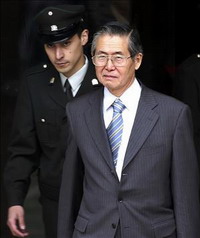Human rights groups claim for Alberto Fujimori's extradition to Peru
Human rights groups want former President Alberto Fujimori's extradition to Peru to face charges of corruption.

Fujimori was flown to Peru Saturday, a day after Chile's Supreme Court authorized the 69-year-old's extradition to answer to seven charges, including sanctioning the killings of 25 people during his 1990-2000 government. He is being held at a police base until a permanent facility is prepared for his detention.
The decision to extradite Fujimori is part of a larger trend, said human rights lawyer Joan Garces, a former aide to Chilean President Salvador Allende, who was overthrown by Augusto Pinochet in a 1973 military coup.
"It's very positive thing that heads of state know that their crimes will be pursued," Garces said by telephone from Spain. Garces worked on an unsuccessful bid to extradite Pinochet from London to face human rights charges in Spain. Pinochet died last year in Chile.
Miguel Vivanco, Americas director for Human Rights Watch, called the Chilean court's decision to authorize Fujimori's extradition a "landmark ruling."
"After years of wrestling with Pinochet's legacy of atrocities, Chile is now building a positive record on human rights and justice," Vivanco said in a statement.
In Peru, prosecutors are seeking 30 years in prison for each human rights charge, and up to 10 years for the corruption charges. Prison terms run concurrently under Peruvian law. Fujimori has called the charges against him politically motivated and said he has a clear conscience.
Fujimori's return has provoked mixed reactions in his homeland.
Many Peruvians are eager to see him tried for his crackdown on the bloody Shining Path insurgency and alleged corruption during his presidency.
"He had to come back," said Lucio Quispe, a 44-year-old construction worker who fled his home in Apurimac for Lima in 1982, fearing violence.
But Fujimori maintains a following in Peru. He was admired for ushering in economic stability and defeating the Shining Path. A recent poll showed that 23 percent of Peruvians want to see him back in politics.
"There has been corruption in every government," said Enrique Saucedo, a 55-year-old car salesman in Lima. "He had a good government, a lot of projects, and most important: peace."
Some remember Fujimori warmly for building schools, hospitals and roads in the Andean country's impoverished interior.
When his government unraveled amid charges of corruption and increasing authoritarianism, he found a safe refuge in Japan, where he enjoyed immunity from extradition because of his Japanese nationality, inherited from his migrant parents.
But in November 2005, Fujimori stunned Peruvians when he flew to Chile and revealed his ambition to run again for Peru's presidency, even though Congress had banned him from seeking public office until 2011. He was promptly arrested by Chilean authorities.
Other former leaders accused of abuses are facing pressure in Latin America.
A Spanish judge has issued arrest warrants for former Guatemalan dictator Efrain Rios Montt for genocide and torture during the country's 36-year civil war. But Rios Montt won a seat in Guatemala's congress in September, giving him immunity for prosecution for his four-year term.
In Uruguay, former President Juan Maria Bordaberry faces prosecution by a judge probing 14 killings during the dictatorship's crackdown on dissent in the 1970s.
In Argentina, President Nestor Kirchner has made settling dictatorship-era human rights cases a priority.
In Peru, Fujimori's daughter, Keiko, a Peruvian lawmaker, said her father is "calm" but has a cold.
"Obviously, my father was exhausted when he arrived. It was a long trip. He also arrived with a cold," she said on Sunday. "He needed oxygen during the trip, but he's fine."
The Justice Ministry said Fujimori had shown signs of hypertension following a medical exam at the base on Saturday morning.
Subscribe to Pravda.Ru Telegram channel, Facebook, RSS!


